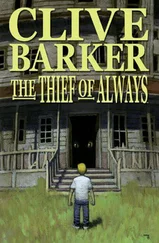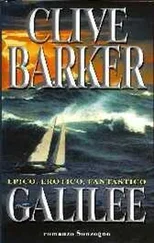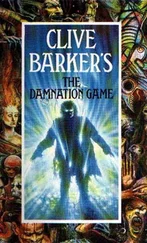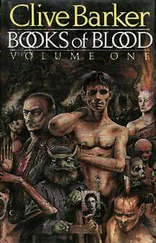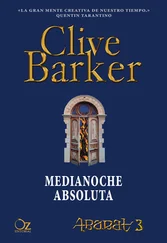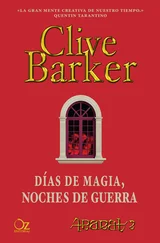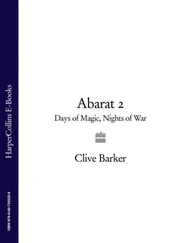Clive Barker - Sacrament
Здесь есть возможность читать онлайн «Clive Barker - Sacrament» — ознакомительный отрывок электронной книги совершенно бесплатно, а после прочтения отрывка купить полную версию. В некоторых случаях можно слушать аудио, скачать через торрент в формате fb2 и присутствует краткое содержание. Жанр: Фантастика и фэнтези, на английском языке. Описание произведения, (предисловие) а так же отзывы посетителей доступны на портале библиотеки ЛибКат.
- Название:Sacrament
- Автор:
- Жанр:
- Год:неизвестен
- ISBN:нет данных
- Рейтинг книги:5 / 5. Голосов: 1
-
Избранное:Добавить в избранное
- Отзывы:
-
Ваша оценка:
- 100
- 1
- 2
- 3
- 4
- 5
Sacrament: краткое содержание, описание и аннотация
Предлагаем к чтению аннотацию, описание, краткое содержание или предисловие (зависит от того, что написал сам автор книги «Sacrament»). Если вы не нашли необходимую информацию о книге — напишите в комментариях, мы постараемся отыскать её.
Sacrament — читать онлайн ознакомительный отрывок
Ниже представлен текст книги, разбитый по страницам. Система сохранения места последней прочитанной страницы, позволяет с удобством читать онлайн бесплатно книгу «Sacrament», без необходимости каждый раз заново искать на чём Вы остановились. Поставьте закладку, и сможете в любой момент перейти на страницу, на которой закончили чтение.
Интервал:
Закладка:
' "I beg you, send me news of him if you have any, so when I look towards the isles I may imagine him, and be soothed."'
This was powerful stuff; but difficult for Will to sympathize with. He had made his way in the world largely by defying tutelage, so this yearning for a teacher, so passionately phrased Simeon might have been speaking of physical desire, seemed to him faintly preposterous. To Dwyer also. 'It was,' she wrote, 'an indication that Simeon was undergoing a profound psychological upheaval. And there was more; a good deal more. In a second letter to Cruikshank, written from Glasgow, less than a week later, Simeon's over-ripe imaginings are running riot:
' "I heard from a certain source that the Man of the Western Isles has finally turned his golden architect to his purpose, and has the foundation of Heaven laid. What source is this, you ask? I will tell you, though you may mock me. The wind; that is my messenger. I have inklings from other sources, it's true, but none I trust as much as the wind, which brought me nightly such reports of all our Certain One has done that I began to sicken for want of sleep, and have retreated to this foul Caledonian town where the wind does not come with such fresh news.
' "But what use is it to sleep, if I wake in the same state that I lay down my head? I must mend my courage, and go to him. At least that is what I think this hour. The next I may be of another opinion entirely. You see how it is with me? I have contrary thoughts on every matter now, as though I were divided as surely as his architect. That was the trick by which he turned the creature to his purpose, and I wonder if he sowed the same division in my soul, as punishment for my betrayal. I think he would do that. I think he would take pleasure in it, knowing I would come after him at last, and that the closer I came the more set against myself I would become."
'Here,' Dwyer wrote, 'is the first mention of suicidal thoughts. There is no record of any reply from the pen of Mrs Cruikshank, so we must assume she judged Simeon so far gone he was beyond her help. Once only, in the last of the four letters he wrote to her during his Scottish sojourn does he refer to his art:
' "Today I have conceived a plan as to how I may play the prodigal. I will make a portrait of my Certain One upon his island. I have heard it called the Granary, so I will make the painting surrounding him with grain. Then I will take it to him, and pray that my gift assuages his rage. If it does then I will be received into his house and will gladly do his bidding until I die. If it does not, then you may assume I am dead by his hand. Whichever is the case, you will not hear from me after this."
'This pitiful letter,' Dwyer here remarked, 'was the last he ever wrote. It is not the last we hear of him, however. He survives for another seven months, travelling to Bath, to Lincoln, and to Oxfordshire, relying on the charity of friends. He even paints pictures, three of which survive. None of them fits the description of the Granary painting he is planning in his letter to Dolores Cruilcrhank. Nor is there any record of his having travelled to the Hebrides in search of Rukenau.
'It seems most likely that he gave up on the endeavour entirely, and went south from Glasgow in search of more comfortable lodgings. At some point in the travels, John Galloway tracks him down, and commissions him to paint the house he and his new wife (he had married in September of 1725) now occupy. As Galloway reports in a letter, to his father:
' "My good friend Thom Simeon is now at work immortalizing the house, and I have high hopes that the picture will be splendid. I believe Thomas has it in him to be a popular artist, if he can just put aside some of his high-flown notions. I swear if he could he would paint an angel blessing every leaf and blade of grass, for he tells me he looks hard to see them, noon and night. I think him a genius, probably; and probably mad. But it is a sweet madness, which offends Louisa not at all. Indeed she said to me, when I told her he looks for angels, that she did not wonder that he failed to see them, for he shed a better brightness than they, and shamed them into hiding. " '
An angel blessing every leaf and blade of grass - there was an image to conjure with, Will thought. Weary of Dwyer's prose now, of guesswork and assumptions, he returned to The Fertile Acre and studied it afresh. As he did so he realized the connection between this image and his own pictures. They were before and after scenes; bookends to the holocaust text that lay between. And the author of that text? Jacob Steep, of course. Simeon had painted the moment before Steep appeared: all life in terror at Jacob's imminence. Will had caught the moment after: life in extremis, the fertile acre become a field of desolation. They were companion creators, in their way; that was why his eye came back and back to this picture. It was painted by a brother, in all but blood.
There was a light tapping at the door, and Adele appeared, telling him she was off to bed. He glanced at his watch. It was ten-forty, to his astonishment.
'Goodnight then,' he said to her, 'sleep well.'
'I will,' she said. 'You do the same.' Then she was gone, leaving him to the last three or four pages of Simeon's life. There was little of any consequence in the remaining paragraphs. Dwyer's researchers ran out of steam two months or so before Simeon's passing.
'He died on or about July eighteenth, 1730,' she wrote, 'having reportedly swallowed enough of his own paints to poison himself. This, at least, is what is widely assumed to be the truth. There are in fact contradictory voices in this matter. An anonymous obituary in The Review, for instance, published four months after Simeon's death, hints darkly that "the artist had fewer reasons to die than others did to silence him."And Dolores Cruikshank, writing to Galloway at about the same time remarks that: "I have been trying to locate the physician who examined Thomas's corpse, because I heard a rumour that he'd found curious and subtle dislocations in the body, as though it had been subjected to an assault before death. I thought of the 'invisibles' you told me he had been so fearful of when you'd taken him from Rukenau's place. Had they perhaps mounted an attack upon him? But the physician, a Doctor Shaw, has disappeared apparently. Nobody knows where, or why. "
'There was one final oddity. Though John Galloway had made arrangements for his agents to collect the body and have it removed to Cambridge, where he'd arranged for it to be buried with due honours, when they came to do so the remains had already been spirited away. Thomas Simeon's last resting place is therefore unknown, but this writer believes his body was probably taken by land and sea to the Hebrides, where Rukenau had chosen to retreat. It is unlikely, given Rukenau's iconoclastic beliefs, that Simeon was buried in hallowed ground. It's more likely he lies in some anonymous spot. It is only to be hoped that he rests well there, the travails of his life ended before he had truly made any mark upon the art of his time.
'John Galloway was killed in 1734, accidentally shot during a military exercise on Dartmoor; Piers Varty and Edmund Maupertius, who assisted Galloway in the abduction of Simeon from Rukenau's house, both died young: Varty perished of consumption and Maupertius, arrested for smuggling opium in Paris, died of a heart attack in police custody. Only Dolores Cruikshank lived out her biblical span, and more, dying at the age of ninety-one. Much of the correspondence quoted here was in the possession of her heirs.
'As for Gerard Rukenau, despite four years of attempts by this author to uncover the truth behind his legendary existence, little beyond the information contained within these pages could be found. There is no trace of the house in Ludlow from which Galloway supposedly abducted him, nor are there extant any letters, pamphlets, wills or other legal documents bearing his name.
Читать дальшеИнтервал:
Закладка:
Похожие книги на «Sacrament»
Представляем Вашему вниманию похожие книги на «Sacrament» списком для выбора. Мы отобрали схожую по названию и смыслу литературу в надежде предоставить читателям больше вариантов отыскать новые, интересные, ещё непрочитанные произведения.
Обсуждение, отзывы о книге «Sacrament» и просто собственные мнения читателей. Оставьте ваши комментарии, напишите, что Вы думаете о произведении, его смысле или главных героях. Укажите что конкретно понравилось, а что нет, и почему Вы так считаете.

